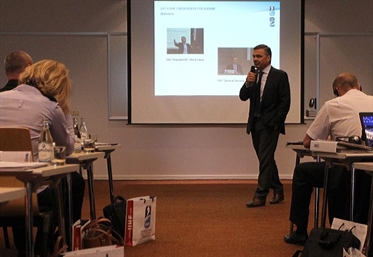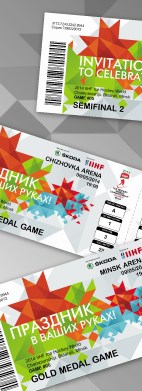Learning from each other
Learning from each other
Experiences in Stockholm, Helsinki valuable for next hosts

 IIHF President René Fasel welcomes the organizers of the next three years’ World Championships. Photo: Andre Ringuette / HHOF-IIHF Images
IIHF President René Fasel welcomes the organizers of the next three years’ World Championships. Photo: Andre Ringuette / HHOF-IIHF Images
Observer Program and Transfer of Knowledge are the buzzwords for when the organizers for the next three editions – 2014 in Minsk, Belarus; 2015 in Prague and Ostrava, Czech Republic; and 2016 in Moscow and St. Petersburg, Russia – meet with the International Ice Hockey Federation to discuss operational matters for the IIHF's flagship event.
The annual workshop is part of a program to make sure hosts don’t have to start from scratch, but instead profit from past experiences and knowledge-sharing.
“We have good experience and know how things should go and should not go,” said IIHF President René Fasel in his opening speech, mentioning the seasoned staff that organizes the workshop.
“The most important people at a World Championship are the teams. You have to do the best possible for the athletes and the referees. Then you have other groups like fans and media that need to be treated well, and officials.”
“What we have pulled together with this Transfer of Knowledge Program is unique,” said IIHF General Secretary Horst Lichtner. “You get all our experts from many areas.”
He explained how the program was developed together with the International Olympic Committee when the idea came in 2009.
“Our program is now also looked at by other winter sport federations,” he said.
Lichtner’s key message to the organizers: Don’t make a mistake twice.
“That's why we have the program. One organizer makes the experience and the next can profit on it,” he said.
Continue readingThe program is led by IIHF Deputy General Secretary and Event Director Hannes Ederer, who has been working for the IIHF for 16 years, and Cornelia Ljungberg, IIHF Event Development Director, whose experience with IIHF Ice Hockey World Championships dates back to Stockholm 1989. She joined the IIHF to run this program after the 2009 IIHF World Championship in Switzerland where she was part of the organizing committee.
During the year the program includes several workshops to make sure organizers get the best possible support, video conferences, site visits, online planning and sharing tools, debriefing and transfer of knowledge from past and current to future hosts of the biggest annual winter sports event. This is in addition to a number of regulatory documents that model the structure and needs for a World Championship.
“You have a very big responsibility. You have been trusted by the Congress to build the top event of the IIHF’s program. It is the most important event for the IIHF and the income benefits hockey in our 72 member nations,” said Hannes Ederer.
It’s this event, through its marketing and broadcasting contracts, that generates the revenue to finance development programs all over the world and dozens of tournament in developed and developing hockey countries, for men, women and youth.
Having an international exchange of knowledge and ideas from all sides is important to spread the hockey festival feeling of the tournament to different countries, while adapting to the customs of the various host cities and countries.
“You know how to organize a hockey tournament but we need to come together to benefit from our various experiences,” said Ederer in his welcoming address to the organizers.
“You have once in maybe ten years the chance to organize the biggest hockey festival and give something to the fans in your country. Show what hockey is about to your country and organize a party for the fans.”
For the roughly 30 participants from the three organizing committees from Belarus, for the Czech Republic and Russia it means two days of learning with no less than 288 slides.
The topics are covered by 20 experts in various fields: from the IIHF, its partners like the event’s marketing agency Infront Sports & Media, and from the current organizing committee.
The logistical questions alone are numerous: How to select accommodation and work on contracts? What are the needs of the 16 teams and the “17th team” – the referees and linesmen? How should the arena with its tribunes and rooms be used and signed?
Then come sport issues and with it medical topics, anti-doping, statistics and uniform services. How to organize ticket sales and entertain the fans? Event planning follows with its various fields including ceremonies, accreditation, transportation, security, hospitality areas and also the IIHF Annual Congress that is held during the event.
What are the best practices in marketing, PR and media operation, broadcasters, IT, finance, legal and insurances?
There’s plenty to learn and share for the organizers – but it’s worth it.
“It would be a waste not to make use of the knowledge that is gained in events,” said Cornelia Ljungberg.
“It’s difficult to set up all the knowledge and experienced from scratch. To have knowledge reduces risks, maximizes opportunities and increases quality. In the end we need to deliver a perfect event.”
And as usual there are no classroom sessions without the practical part. The organizers had a tour in three different topical groups through the Globe Arena in Stockholm and closed the workshop by following the game operations during the Sweden-Canada preliminary-round match.
Back to Overview

















































































